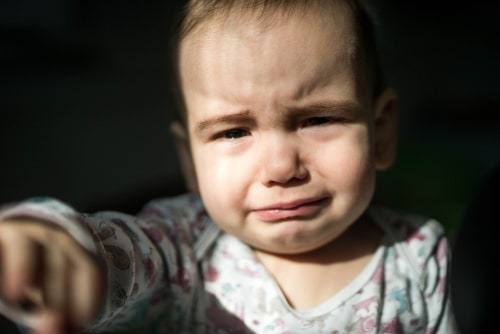Baby sleep problems caused by medical conditions: Does your baby suffer from GERD, cow’s milk allergy, or snoring?


According to researchers, most infant sleep problems are caused by behavioral factors (France and Blampied 1999), and there’s a great deal that parents can do to remedy such problems. For help, see my troubleshooting guide.
But sometimes there are “organic” factors to blame — medical reasons why a baby won’t sleep. Some of the more obvious culprits are infections, like infections of the ear, skin, respiratory system, or urinary tract. In addition, babies can experience disturbed sleep if they suffer from allergies (Chen et al 2021) or atopic dermatitis (O’Connor et al 2022), and no wonder. It’s hard to sleep if you are experiencing a runny nose; burning, itchy eyes; or dry, itchy, inflamed skin.
So, if we pay attention – and seek medical care when we observe signs of illness – we can make it easier for our babies to sleep. Still, it depends on our ability to notice those signs of illness. It’s pretty straightforward when our babies have a fever, rash, or cough. Most parents are well-acquainted with the effects of infections and allergies! But there are other medical conditions that can cause sleep problems in infants — conditions that many parents are less familiar with:
- acid reflux (Kahn et al 1991);
- cow’s milk allergy (Kahn et al 1988); and
- snoring and breathing irregularities (Sargi and Younis 2007).
They aren’t responsible for the majority of sleep disturbances in babies, but it’s good to have them on your radar, and important consult with your pediatrician if you observe symptoms. They can be harmful if left untreated. Let’s take a closer look at each one.
Acid reflux and gastroesophageal reflux disease (GERD)
All infants experience some degree of gastroesophageal reflux (GER), or “spitting up”: The contents of the stomach are forced back into the esophagus. But some babies suffer more than others, and reflux episodes are known to disturb sleep. In studies that have monitored esophageal acid levels in infants while they slept, babies were much more likely to experience arousals after a reflux episode than at other times (Kahn et al 1991: Machado et al 2013).
GER can be painful and can cause colic and vomiting. It is also risk factor for pulmonary disease (Paton et al 1989). Gastroesophageal reflux is classified as a disease (“gastroesophageal reflux disease” or “GERD”) when it causes
- resistance to feeding
- blood in the vomit or stool
- iron deficiency anemia
- irritability (due to an inflamed esophagus), or
- failure to thrive.
The rate of full-fledged GERD among infants is unknown. Some researchers estimate that 4% – 6% of children suffer from GERD (Jolley et al 1999; Martigne et al 2012). Studies of infants have reported rates above 10%, with GERD symptoms peaking at 4 weeks postpartum (Curien-Chotard and Jantchou 2020).
Whether your baby suffers from GERD or the more common, less severe GER, you may improve your baby’s symptoms by avoiding acidic foods and by keeping him or her in an upright position for the first 20 minutes or so after a feeding. If reflux is causing baby sleep problems, such remedies may help reduce night awakenings.
If you suspect your baby has an acid reflux problem, consult your pediatrician. There are a number of medical procedures — such as endoscopies and tests of esophageal pH — that can help diagnose cases of GERD. Babies with GERD may require special treatments, including drug therapy, to prevent choking and damage to the esophagus.
Cow’s milk allergy
Studies suggest that cow’s milk allergy — an intolerance to a protein found in cow’s milk — affects between 0.5% and 3% of infants (Salvatore et al 2021; Yang et al 2019). Most sufferers are formula-fed babies. However, breastfed babies might also acquire cows’ milk allergy if their mothers consume milk products (Coscia et al 2012).
Symptoms among infants usually take the form of gastrointestinal problems, such as vomiting, diarrhea, abdominal cramps and bloating (Host 1997). In addition, sufferers may get skin rashes and experience respiratory symptoms, like cough and runny nose. Cow’s milk allergy may also cause baby sleep problems — specifically more arousals, shorter sleep cycles, and dramatic reductions in total sleep time (Kahn et al 1988; Kahn et al 1989).
If cow’s milk is causing your trouble for your infant, symptoms should improve within a few weeks of removing all cow milk products from his or her diet (Kahn et al 1988; Kahn et al 1989).
In one small study, infants (averaging 18 weeks of age) who stopped consuming cows’ milk products for seven weeks increased their total sleep time by over 22%. They also experienced over 40% fewer arousals. If babies resumed consumption of cows’ milk, their sleep problems returned (Kahn et al 1988). A second, much larger experimental study of babies (average age: 13 months) confirmed these results. Before intervention, sufferers slept an average of 5.5 hours every 24 hours. After cow milk was removed, babies were sleeping an average 13 hours (Kahn et al 1989)!
Note that cows’ milk allergy is different from lactose intolerance, though both conditions involve symptoms of bloating, abdominal pain, and diarrhea. Lactose intolerance is an inability to digest the principle sugar in all milk (whether it be human or cow or goat or any other kind). In general, babies don’t suffer from lactose intolerance. Babies who do have trouble are usually either premature infants (whose digestive systems aren’t yet fully developed), severely malnourished infants, or infants who are recovering from an infection of the small intestine. In the latter case, lactose intolerance is temporary (Heyman 2006).
Snoring and sleep-disordered breathing
Snoring occurs in 15-25% of infants (Mitchell and Thompson 2003), and it used to be viewed as harmless. But modern research suggests otherwise.
Some babies who habitually snore may suffer from obstructive sleep apnea syndrome, in which the upper airways repeatedly collapse or partially collapse. This forces the baby to wake up. Other symptoms of obstructive sleep apnea include labored, irregular breathing, and restlessness during sleep.
Obstructive sleep apnea is bad because it prevents kids from getting enough sleep. But it’s also bad because it deprives sufferers of oxygen, which can cause a variety of more serious cognitive, health, and developmental problems (Sargi and Younis 2007; Piteo et al 2011). And if infants don’t awaken when they experience breathing difficulties, they are at higher risk for sudden infant death syndrome (SIDS).
What if it’s “just snoring” — with no sign of obstructive sleep apnea? This, too, is problematic. For instance, 8-month old infants who were frequently aroused from sleep by snoring performed more poorly on tests of mental development (Montgomery-Downs and Gozal 2006). Snoring babies exposed to second-hand smoke may be at increased risk (Montgomery-Downs and Gozal 2006). It’s consistent with research on older children: Snoring affects daytime behavior and cognition (Horne 2022; Yu et al 2022).
Does this mean you should panic if your baby is a habitual snorer? No. But you should consult your pediatrician and have your baby screened for more serious breathing problems. Sleep disordered breathing (SDB) is one of the treatable baby sleep problems, and many of the developmental effects of SDB can be reversed (Montgomery-Downs and Gozal 2006).
More information
For more evidence-based information about baby sleep, see my article “Baby sleep patterns: A guide for the science-minded parent.”
References: Baby sleep problems caused by medical conditions
Coscia A, Orrù S, Di Nicola P, Giuliani F, Rovelli I, Peila C, Martano C, Chiale F, Bertino E. 2012. Cow’s milk proteins in human milk. J Biol Regul Homeost Agents. 26(3 Suppl):39-42.
Curien-Chotard M and Jantchou P. 2020. Natural history of gastroesophageal reflux in infancy: new data from a prospective cohort. BMC Pediatr. 20(1):152.
France KG and Blampied NM. 1999. Infant sleep disturbance: Description of a problem behaviour process. Sleep Medicine Reviews 3(4): 265-280.
Heyman MB 2006. Lactose intolerance in infants, children, and adolescents. Pediatrics 118: 1279-1286.
Host A. 1997. Cow’s milk allergy. Journal of the Royal Society of Medicine. 90 (S30): 34-39.
Horne RSC. 2022. Childhood snoring cannot be ignored as it has detrimental effects on neurobehavior. Sleep. 45(5):zsac045.
Jolley SG, Lorenz ML, Hendrickson M, and Kurlinkski JP. 1999. Esophageal pH Monitoring Abnormalities and Gastroesophageal Reflux Disease in Infants With Intestinal Malrotation Arch Surg. 134:747-753.
Jung AD. 2001. Gastroesophageal reflux in infants and children. American family physician 64: 1853-1860.
Kahn A, Rebuffat E, Sottiaux M, Dufour D, Cadrenal S, Reiterer F. 1991. Arousals induced by proximal esophageal reflux in infants. Sleep 14: 39-42.
Kahn A, Francois G, Sottiaux M, Rebuffat E, Nduwimana M, Mozin MJ, and Levitt J. 1988. Sleep characteristics in milk-intolerant infants. Sleep 11(3): 291-297.
Kahn A, Mozin MJ, Rebuffat E, Sottiaux M, and Muller MF. 1989. Milk intolerance in children with persistent sleeplessness: A prospective double-blind crossover evaluation. Pediatrics 84: 595-603.
Machado R, Woodley FW, Skaggs B, Di Lorenzo C, Splaingard M, and Mousa H. 2013. Gastroesophageal reflux causing sleep interruptions in infants. J Pediatr Gastroenterol Nutr. 56(4):431-5.
Martigne L, Delaage PH, Thomas-Delecourt F, Bonnelye G, Barthélémy P, and Gottrand F. 2012. Prevalence and management of gastroesophageal reflux disease in children and adolescents: a nationwide cross-sectional observational study. Eur J Pediatr. 171(12):1767-73.
Mitchell EA and Thompson JMD. 2003. Snoring in the first year of life. Acta Paediatr. 92:425–429.
Montgomery-Downs HE and Gozal D. 2006. Snore-Associated Sleep Fragmentation in Infancy: Mental Development Effects and Contribution of Secondhand Cigarette Smoke Exposure. Pediatrics 117(3): e496-e502.
O’Connor C, Irvine AD, Murray D, Murphy M, O’B Hourihane J, Boylan G. 2022. Study protocol: assessing SleeP IN infants with early-onset atopic Dermatitis by Longitudinal Evaluation (The SPINDLE study). BMC Pediatr. 22(1):352.
Paton JY, MacFadyen UM, and Simpson H. 1989. Sleep phase and gastro-oesophageal reflux in infants at possible risk of SIDS. Arch Dis Child 64(2):264-9.
Piteo AM, Kennedy JD, Roberts RM, Martin AJ, Nettelbeck T, Kohler MJ, Lushington K. 2011. Snoring and cognitive development in infancy. Sleep Med. 12(10):981-7
Salvatore S, Agosti M, Baldassarre ME, D’Auria E, Pensabene L, Nosetti L, Vandenplas Y. 2021. Cow’s Milk Allergy or Gastroesophageal Reflux Disease-Can We Solve the Dilemma in Infants? Nutrients. 13(2):297.
Sargi Z and Younis RT. 2007. Pediatric obstructive sleep apnea: current management. ORL J Otorhinolaryngol Relat Spec. 69(6):340-4.
Yang M, Tan M, Wu J, Chen Z, Long X, Zeng Y, Cai H, Zhang Y, Geng L, Xiao Y, Ke H, Liu Y, Rong L, Fu S, Wang H, Wang Y, Li X, Chen P, Li K, Xie J, Chen H, Li H, Wang H, Li DY, Gong S. 2019. Prevalence, Characteristics, and Outcome of Cow’s Milk Protein Allergy in Chinese Infants: A Population-Based Survey. JPEN J Parenter Enteral Nutr. 43(6):803-808.
Yu PK, Radcliffe J, Gerry Taylor H, Amin RS, Baldassari CM, Boswick T, Chervin RD, Elden LM, Furth SL, Garetz SL, George A, Ishman SL, Kirkham EM, Liu C, Mitchell RB, Kamal Naqvi S, Rosen CL, Ross KR, Shah JR, Tapia IE, Young LR, Zopf DA, Wang R, Redline S. 2022. Neurobehavioral morbidity of pediatric mild sleep-disordered breathing and obstructive sleep apnea. Sleep. 45(5):zsac035.
Last modified 10/2022. Portions of text derive from an earlier version of this article, written by the same author.
image of crying infant by Colors United / istock















